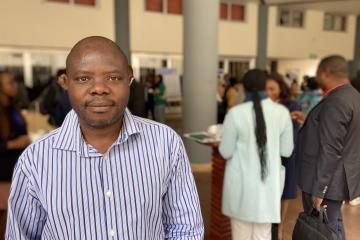
African Scholar Spotlight: Dr. Jaah Mkupete

This post is part of our ongoing series showcasing the work and perspectives of economists from the African continent who are leading randomized evaluations. Through our African Scholars Program, we hope to help create more opportunities for African researchers to advance the research agenda on the continent through randomized evaluations.
In this spotlight, we speak with Jaah Mkupete, a lecturer of economics at the University of Dar es Salaam. Jaah’s primary research interests are broadly in development economics and applied econometrics, including agricultural economics and human capital development, particularly health and education.
What drew you into the field of development economics and, in particular, working with impact evaluations?
My journey into the field of development economics began in 2006 when I made the pivotal decision to switch from studying pure science subjects to economics. I was greatly inspired by renowned economists in my country, including Professor Ibrahim Lipumba, whom I had the opportunity to encounter in numerous national budget debates. Back then, my knowledge of economics was quite limited, primarily focused on its role in government budgeting and the efficient allocation of scarce resources. Unfortunately, my undergraduate program did not provide me with a strong theoretical foundation in development economics, as it emphasized general macro and microeconomics content and methods over specific development economics courses. It wasn't until my master's degree that I gained a genuine understanding of development economics through my involvement in fieldwork. These experiences allowed me to witness firsthand the myriad challenges faced by underserved communities in rural areas. This exposure ignited my interest in delving into the root causes of poverty and inequality, instilling in me a deep sense of empathy and a strong desire to contribute to initiatives aimed at improving the lives of the less fortunate.
What particularly captivated me was the notion that rigorous research and impact evaluations could offer invaluable insights into the effectiveness of a wide range of policies and interventions, shedding light on what works and what doesn't within the realm of development. I grew up in Dar es Salaam, a region teeming with business potential yet rife with obstacles that hinder youth participation in entrepreneurship. This fueled my curiosity to explore interventions addressing challenges related to access to entrepreneurship and digital skills.
My academic journey, especially during my PhD training, exposed me to the power of data, econometric techniques, and randomized controlled trials (RCTs) as tools to unveil causal relationships and assess the impact of programs and policies. This methodological aspect of development economics fascinated me because it offered a means to provide concrete evidence for policymakers and practitioners, ultimately leading to more informed decisions and improved outcomes for vulnerable populations.
What are you using initiative funds to do? What research question are you trying to answer, and how does it relate to your context?
I secured funding through the J-PAL Jobs and Opportunity Initiative to bolster my pilot research, which centers on tackling the pressing issue of unemployment in the Tanzanian context. The central research question of this pilot project assesses the impact of digital skills training and access to credit on the sales and profitability of youth-led businesses in Tanzania. This research question holds significant relevance for Tanzania, given the substantial potential of entrepreneurship to provide employment opportunities for youth.
Additionally, Tanzania's strategic geopolitical location suggests that businesses with effective utilization of digital platforms may not only serve the domestic market but also explore cross-border opportunities for enhanced profitability.
What do you see as the big unanswered research questions in your context that RCTs may be able to help answer? Does this relate to any projects you are excited to work on in the future?
There are several important unanswered questions that RCTs can help address. Currently, I am working on the economics of education, and one of the policy-relevant questions I intend to tackle using RCTs pertains to issues of information asymmetry, moral hazard, and child school attendance in Tanzania. I plan to implement an intervention aimed at enhancing communication between parents and schools, thereby reducing the information gap regarding attendance.
How has the support you have received from J-PAL to date assisted you in your career? How can organizations like J-PAL continue to build on the support they provide to local researchers in running randomized evaluations?
I have found the support from J-PAL to be instrumental in advancing my career as a researcher. Their financial support through initiatives like JOI has allowed me to conduct a pilot study, which will increase my visibility as a researcher and provide me with networking opportunities for future collaborations. Moreover, the training opportunities, workshops, and access to training materials prepared by J-PAL have been invaluable in enhancing my research skills and knowledge in the field of impact evaluation.
Regarding support to local researchers, J-PAL and other similar organizations could consider expanding the number of funding opportunities available to local researchers, continuing to offer programs, workshops, and training sessions that focus on cutting-edge research methodologies, and facilitating mentorship programs that connect experienced researchers with emerging scholars to foster knowledge transfer and collaboration.
Do you have advice to offer other young aspiring African scholars thinking about a career in economic research?
Economics is fascinating—once you venture into economics, particularly research, you’ll never want to go back. To progress in a career in development economics, one needs to develop strong research skills, including data analysis, econometrics, and statistical software proficiency. These skills are essential for conducting rigorous research. It is also important to build a professional network within and outside your institution. Networking can open up opportunities for collaboration and knowledge exchange.



